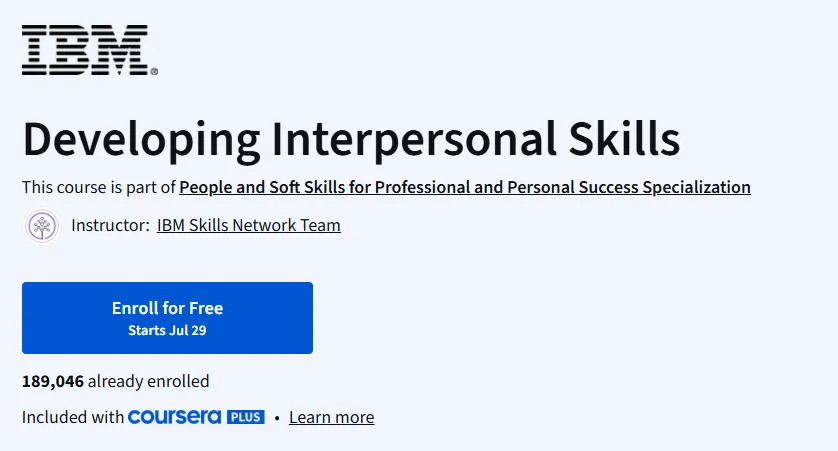What will you learn in Developing Interpersonal Skills Course
Build stronger workplace relationships through improved communication.
Understand emotional intelligence and its impact on collaboration.
Develop active listening, feedback, and conflict resolution skills.
Enhance your ability to collaborate in teams and lead with empathy.
Program Overview
Module 1: Introduction to Interpersonal Skills
⏱️ 1 week
Topics: Defining interpersonal skills, communication frameworks
Hands-on: Self-assessment of current interpersonal skill level
Module 2: Emotional Intelligence & Self-Awareness
⏱️ 1 week
Topics: Self-awareness, empathy, emotional control
Hands-on: Reflective exercises, identifying emotional triggers
Module 3: Active Listening & Feedback
⏱️ 1 week
Topics: Listening types, giving and receiving feedback
Hands-on: Practice sessions, real-world scenarios
Module 4: Conflict Management & Collaboration
⏱️ 1 week
Topics: Conflict types, resolution strategies, team dynamics
Hands-on: Conflict role-play simulations, group decision-making
Module 5: Building Workplace Relationships
⏱️ 1 week
Topics: Trust, influence, rapport-building techniques
Hands-on: Strategy design for effective team interaction
Get certificate
Job Outlook
High demand for soft skills in every industry.
Strong interpersonal skills boost leadership and promotion potential.
Commonly required in HR, management, sales, customer service, and healthcare.
Average salary uplift for professionals with strong people skills.
Specification: Developing Interpersonal Skills
|
FAQs
- No prior experience is required; the course is designed for beginners.
- Focuses on practical skills rather than theoretical knowledge.
- Learners from any professional or academic background can benefit.
- Exercises guide learners step-by-step in improving communication and relationships.
- The course supports gradual development of confidence in interpersonal interactions.
- The course teaches strategies for active listening and empathetic communication.
- Learners practice conflict resolution and assertive communication techniques.
- Real-world scenarios demonstrate handling workplace and personal conflicts.
- Guidance helps maintain professionalism and build trust during tough conversations.
- Skills learned are applicable in team meetings, negotiations, and client interactions.
- The course emphasizes effective collaboration and understanding group dynamics.
- Learners develop skills to motivate, support, and communicate with team members.
- Exercises focus on building rapport, trust, and positive relationships.
- Skills support working in cross-functional or remote teams.
- Knowledge gained improves productivity and cohesion in professional settings.
- Strong interpersonal skills improve leadership, negotiation, and teamwork effectiveness.
- Employers value employees who communicate clearly and collaborate efficiently.
- Skills are transferable across industries and roles.
- Enhances networking, client management, and conflict resolution capabilities.
- Completion of the course demonstrates commitment to personal and professional development.
- Estimated completion is around 2–4 weeks at a part-time pace.
- Weekly commitment of 2–3 hours is generally sufficient to follow lessons and complete exercises.
- Practice exercises and reflection activities help reinforce learning.
- Applying skills in real-life situations may require extra time.
- Consistent engagement ensures learners develop effective interpersonal and communication skills.





